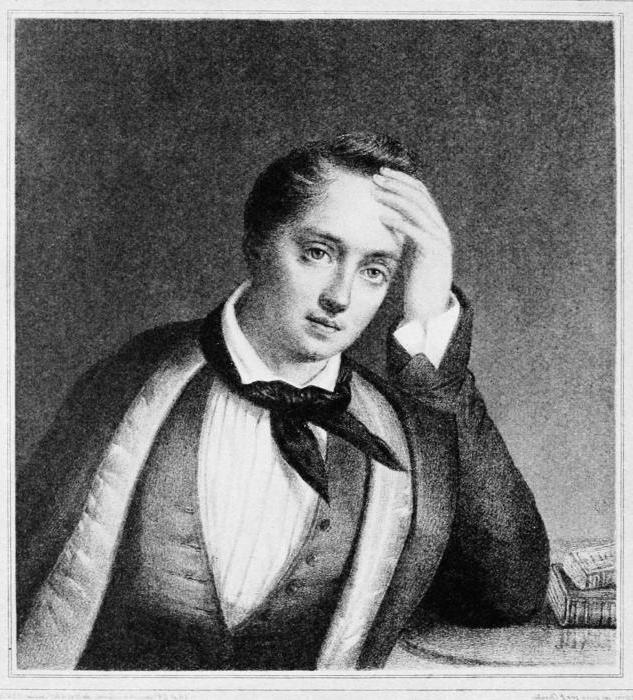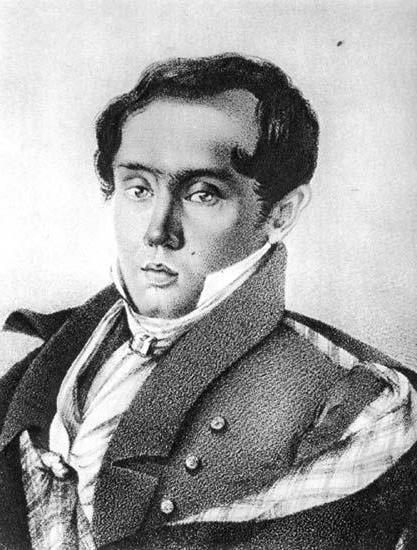Baratynsky Evgeny Abramovich, whose biography arouses sincere interest among fans of poetic lyrics, is a famous Russian poet of the 19th century, a contemporary and friend of Alexander Sergeyevich Pushkin.
Childhood
Born on February 19, 1800 in a poor family of nobles living in the Tambov province. His mother Alexandra Fedorovna was a maid of honor, and father Abram Andreevich was an adjutant general.
The boy spoke foreign languages from early childhood. French was adopted at the Baratynsky’s house; at the age of 8, Zhenya talked freely. Thanks to his uncle, the Italian, Borghese knew Italian, while he studied German in a private boarding house in St. Petersburg, where his parents gave him in 1808.
In 1810, the father was gone, and mother, a smart, educated woman, completely took over the care of raising her son. In 1812, Eugene entered the Page Corps of the city of St. Petersburg. There, with a certain group of comrades, he took part in pranks that ended for him very sadly. One of them bordered on a crime (theft) and became the reason for the exclusion of a young man from an educational institution without the right to enter the civil service, except for a soldier.
This shameful incident greatly affected 15-year-old Eugene. The young man was more than once ready to say goodbye to life. As if through dark glass, Yevgeny Baratynsky began to look at the world around him. His poems had a pessimistic mood, bordering on mental torment experienced by the torments of shame.
Baratynsky Evgeny Abramovich: biography
After the exception, Baratynsky went to the Tambov province, to the village to his mother. Periodically he visited his uncle - Admiral B.A. Baratynsky, who lived in the Smolensk province. Life in the rural expanses fully awakened poetic talent in Eugene. The rhymed strings of the early period were rather weak, but for a couple Baratynsky gained confidence and his own individual style.

In 1819, Eugene Baratynsky, whose poems are studied by the school curriculum, was enlisted in the St. Petersburg Jäger Regiment as an ordinary. The interest in literature during this period prompted him to the fact that the young author purposefully began to seek acquaintance with writers. His work was appreciated by Anton Antonovich Delvig, who had a significant impact on the writing style of Baratynsky. The writer supported the young man morally, helped in the publication of his own works and introduced him to such famous writers as Pyotr Pletnev, Wilhelm Kyukhelbeker, Vasily Zhukovsky and Alexander Pushkin.
"I am reckless - and not marvelous!" - Yevgeny Baratynsky refers to Delvig in this poem, written in 1823, where he talks about his heart sufferings, and the manifestation of friendship with Alexander Sergeyevich was the publication of the book “Two Tales in Poems”, which included Baratynsky’s poems “Ball” and Pushkin “ Count Nulin. "
Years in Finland
In 1820, Baratynsky Yevgeny Abramovich, whose biography arouses the sincere interest of fans of his work, with the rank of non-commissioned officer was in the Neyshlot regiment, based in Finland. There he stayed for 5 years. Life led a calm, secluded. The circle of contacts was made up of a couple of officers with whom he met with the regimental commander. This period, which left the deepest impressions in the mind of Baratynsky, was clearly reflected in his poetry. The harsh land was described in the poems Waterfall, Finland, and Eda.
Epigrams, madrigals, elegy and messages of Baratynsky periodically began to appear in the press. Particularly successful was the poem Pirs, published in 1820. At this time, Eugene became close to the memoirist and historian N. V. Putyata, whom he had kept his friendship with for the rest of his life. Nikolai Vasilievich described Eugene as a thin pale man whose features expressed the deepest gloom.
Baratynsky Evgeny Abramovich: interesting facts
Thanks to the request of Putyata in 1824, Eugene was allowed to come to Helsingfors (the capital of Finland). There he was under the corps headquarters of General Zakrevsky and was very much carried away by his wife Agrafena. The poet devoted many poetic lines to his muse (“I noticeable rapture”, “Justification”, “No, rumor deceived you”, “Fairy”, “Ball”, “I am reckless - and not marvelous!”). Eugene Baratynsky suffered a lot because of this love. Later, the conqueror of male hearts had an affair with A.S. Pushkin.

Meanwhile, Baratynsky's friends stubbornly sought for him the assignment of an officer rank and all the time ran into a refusal by the emperor. The reason for this was the independent nature of the writer's work, his opposition statements. Baratynsky was not a Decembrist, but the ideas embodied in the activities of secret societies completely mastered his consciousness. Political opposition was reflected in the epigram on Arakcheev, the elegy "The Tempest", the poem "Stansa". Finally, in 1825, Eugene was promoted to officer, which gave him the opportunity to control his own fate. He settled in Moscow, started a family (Nastasya Lvovna Engelhard became Evgeny Baratynsky’s wife) and soon retired.
The settled life of Baratynsky
His life became monotonous; his wife was restless, which caused much suffering to Eugene and influenced the fact that many friends moved away from him.
Peaceful family life in the poet smoothed out all that rebellious, violent that tormented him in recent years. The poet lived in the capital, then in his estate (the village of Muranovo), then in Kazan, often traveled to St. Petersburg.
In 1839, Baratynsky met Lermontov Mikhail Yuryevich. In Moscow, he made friends with such writers as N.F. Pavlov, A.S. Khomyakov, I.V. Kireevsky, S.A. Sobolevsky. The result of the first period of Eugene Baratynsky’s work was a collection of his poems published in 1827.
Creativity Baratynsky
The defeat of the Decembrist uprising dramatically changed the social life of Russia, which could not but affect the poetry of Baratynsky. The themes of loneliness, great sorrow, the glorification of death as “the resolution of all chains” (“Death”, “What are you days for,” “Last death”, “Fool”, “Why do slaves dream of freedom?”) Came to the fore in his work. In the poems, pessimistic motives of sorrow, the futility of being, the doom of art, the inferiority of human nature, the impending death of humanity are sharply felt.
In 1832, the European magazine began to be published; one of the active authors was Baratynsky. Only two editions of the publication took place, after which the magazine was banned. The great Russian poet, deprived of a strong urge for verbal work, fell into hopeless, aching longing.
In 1835, the second edition of his works was published, which at that time seemed to be the end of his career. The last book published during the life of Baratynsky was the collection “Twilight” (1842), combining poems from the 1830-1840s and dedicated to Prince Vyazemsky Peter Andreevich. It clearly expresses the contradiction of historical progress and the spiritual and aesthetic nature of man.
Travel to Naples
Since the end of 1839, Baratynsky Yevgeny Abramovich (years of life - 1800-1844) lived with his wife and nine children in the Muranovo estate near Moscow, which later belonged to the Tyutchevs. The poet liked the village life: he was happy to farm, not stopping his creative searches.
In 1843, Baratynsky Yevgeny Abramovich, whose biography was coming to an end, went abroad with older children and his wife, spent six months in Paris, met with writers and public figures in France. To introduce his poetry to the French, the poet translated several poems into his native language.
In 1844, Baratynsky set sail by sea to Naples via Marseille. At the beginning of the journey, he felt unwell, moreover, doctors warned him about the possibility of adverse effects of the sultry climate of Italy. Upon arrival in Naples, Baratynsky’s wife had a painful seizure due to nerves, which had a very strong effect on Yevgeny Abramovich. His headaches sharply intensified, often bothering him. The day after the incident - July 11, 1844 - Baratynsky suddenly died.
The body of the poet was transported to St. Petersburg and buried at the Lazarevsky cemetery, in the Alexander Nevsky monastery.
Baratynsky's poetry - the poetry of thought
As the great Russian poet Alexander Pushkin said, Baratynsky’s poetry is the poetry of thought. A poet of the new time, a romantic with a complex spiritual world, full of sorrow and grief, putting great personal passion into art, was original, because he thought correctly and independently. Belinsky rightly believed that of all the poets - contemporaries of Pushkin, the first place is occupied by Baratynsky Evgeny Abramovich. His work is a huge legacy for the modern generation. After the death of Baratynsky came a long period of almost complete oblivion of his works. Interest in the poet's work revived in the late 20th - early 21st centuries.
The school curriculum includes a poem, which in 1832 was written by Eugene Baratynsky, - "Spring". With unique trepidation and tenderness, the author conveys all the extraordinaryness of the arrival of spring. Nature under the feather of Baratynsky seems to come to life, breathe and sing.
Quite the opposite mood in the poem "Where is the sweet whisper ...". Eugene Baratynsky describes the arrival of winter, its chilling cold, gloomy sky and an evil raging wind.